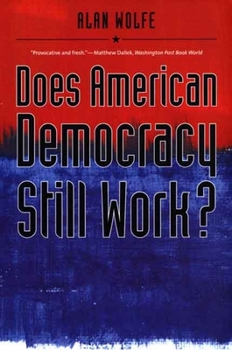Does American Democracy Still Work?
Select Format
Select Condition 
Book Overview
Why Americans should be concerned about recent changes in their democracy
The past few decades have brought a shift in the nature of American democracy--an alarming shift that threatens such liberal democratic values as respect for plur
The past few decades have brought a shift in the nature of American democracy--an alarming shift that threatens such liberal democratic values as respect for plur
Format:Paperback
Language:English
ISBN:0300126107
ISBN13:9780300126105
Release Date:September 2007
Publisher:Yale University Press
Length:224 Pages
Weight:0.60 lbs.
Dimensions:0.7" x 5.3" x 7.7"
Customer Reviews
2 ratings
The New Politics of Democracy
Published by Thriftbooks.com User , 18 years ago
As a frequent contributor to publications such as "The New Republic" and "The American Prospect," it is no secret to which political party Alan Wolfe belongs. That he questions whether American democracy is still working may have to do with the fact that his party has been out of power for many years. (This book was written before the 2006 midterms.) In any case, he leaves himself open to that criticism. In the current work, Wolfe is lamenting the current moralism and populism that has infiltrated political campaigns of recent years. The moral values and populist candidate appeals to the voters emotions rather than their economic self-interest. (Shades of "What's the Matter With Kansas?".) He calls this phenomenon "the new politics of democracy." Wolfe claims, astonishingly, that we operate in a "democracy without information." There is now more information available to the voter than ever before, the problem is that voters have chosen not to use this information. Presumably if they had, they would have voted Democratic in Wolfe's narrative. Wolfe decries the demise of political parties, and the increasing influence of interest groups. This has been especially true in the Republican-controlled Congress, and it is something Democrats must guard against. Fiercely partisan politics has also displaced the traditional influence of elites who were always believed to have the public good in mind. (This lost influence of elites was also lamented by Fareed Zakaria in "The Future of Freedom".) Also the rise of the New Media (internet, cable tv, etc.) tends to raise the emotional level of politics and at the same time undermine traditonal centers of authority and common ground. All that being understood, it can be said in hindsight that the voters in the 2006 midterms have rejected the new politics of democracy. The moralism and populism was muted in the wake of recent scandals. The emotional appeal has not translated into competence and sound policy. The elections were not so much about values as about the results of six years of Republican mismanagement. The answer to Wolfe's question, "Does Democracy Still Work?," is a resounding yes. The hope, however, is that the newly elected Democratic Congress refrain from similar corrupt practices that proverbially accompanies power and stick to the issues. One hopes also that Wolfe remain intellectually honest and hold them to the same standards.
Real clever, perceptive, and pragmatic
Published by Thriftbooks.com User , 18 years ago
Wolfe explains in simple terms the many aspects of modern American politics that weaken, deflect, and encumber our ability to affect or even understand the laws that are being slung at us. Our incredible cynicism about the candor of the media, the ethics of our representation, and the effectiveness of our institutions allows pressure from certain groups to ensure that all of these actually live down to our expectations. Wolfe claims that government is the only thing that is capable of being impartial, and we need to refocus our priority on it. I admit that I was looking forward to a critique of the structure of the federal government (more along the lines of Dahl's "How Democratic is the American Constitution?"). I was satisfied to find, rather, a very empirical look at the political messages he classifies as populism. Corruption and deceit being nothing new, he identifies the new tactic as abandoning the middle to whip up support in the base and discourage the opposition. In this way, Bush has been able to claim support for his radical and illogical ideas. Wolfe also includes a great deal of discussion of the events of the past year, when some would have argued that Bush was backing off. Alan hints that the Democratic Party should be given a chance to straighten things out but never explicitly endorses anyone or rests his argumentation on contingent outcomes of any kind. He insists upon the participation and self-empowerment of individuals as the only way to ensure that the Dems won't be just as bad. Between this title and Stefan Klein's "The Science of Happiness" I have to conclude that pessimism is no longer an option for those who consider themselves mature. It is not a path to pleasant surprises. Rather, it is a dismissive force that has made our habitats less and less livable for several decades despite the fantastic machinery we've surrounded ourselves with. This book is an excellent tool for mastering critiques of the Republicans that have almost nothing to do with Dems, which makes them really hard to rebut. Enjoy.






